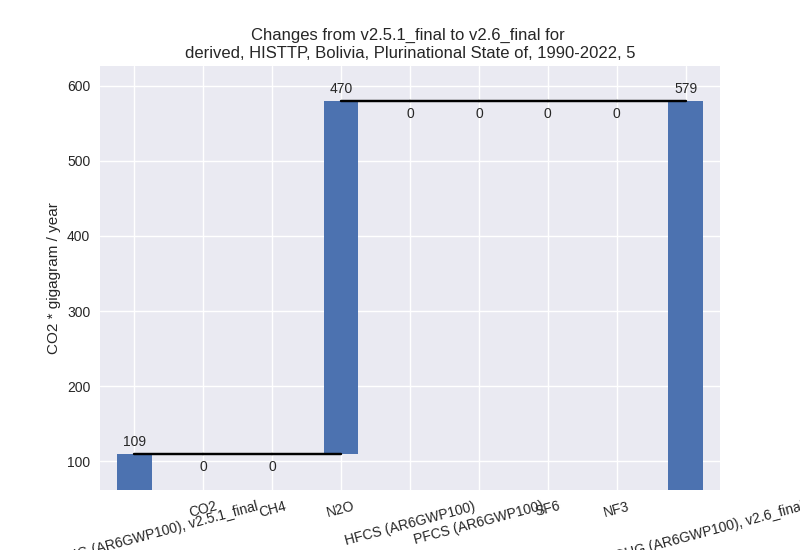Changes in PRIMAP-hist v2.6_final compared to v2.5.1_final for Bolivia, Plurinational State of
2024-09-24
Johannes Gütschow
Change analysis for Bolivia, Plurinational State of for PRIMAP-hist v2.6_final compared to v2.5.1_final
Overview over emissions by sector and gas
The following figures show the aggregate national total emissions excluding LULUCF AR6GWP100 for the country reported priority scenario. The dotted linesshow the v2.5.1_final data.
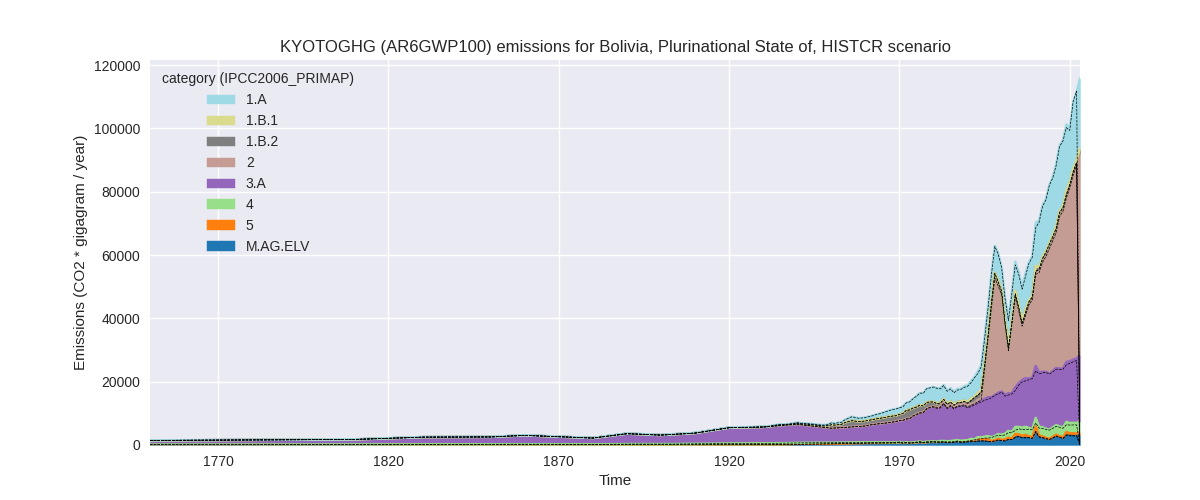
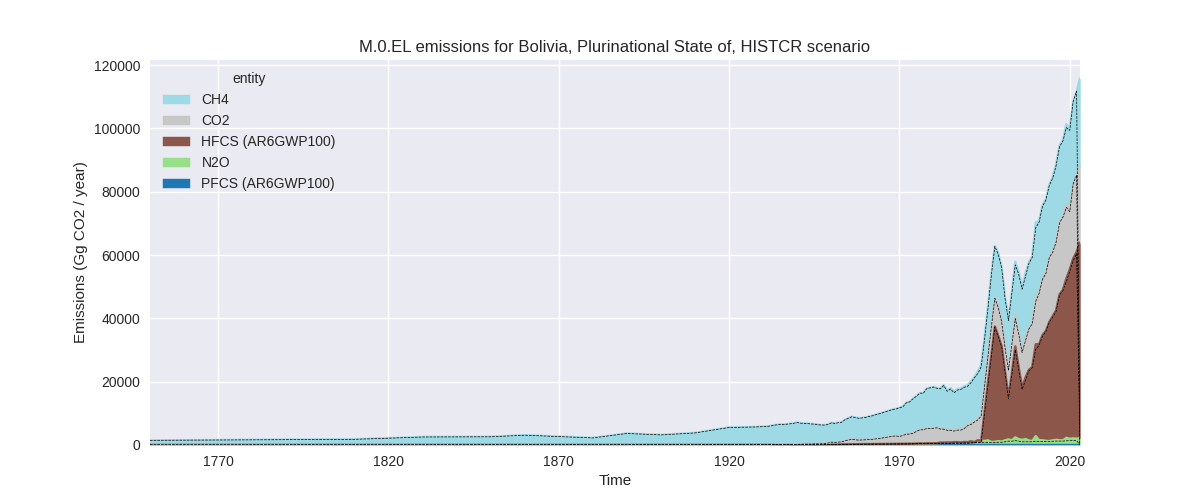
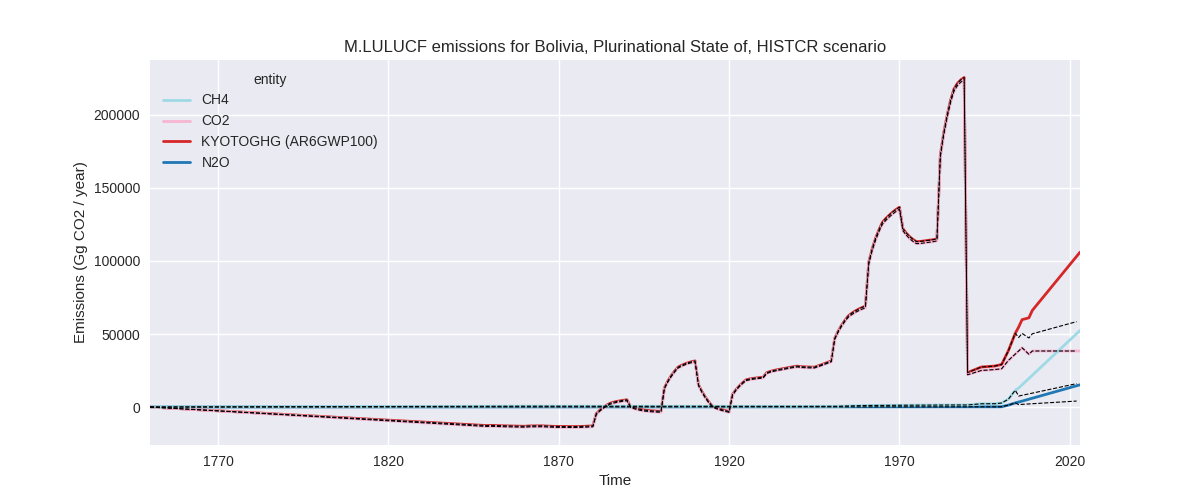
The following figures show the aggregate national total emissions excluding LULUCF AR6GWP100 for the third party priority scenario. The dotted linesshow the v2.5.1_final data.
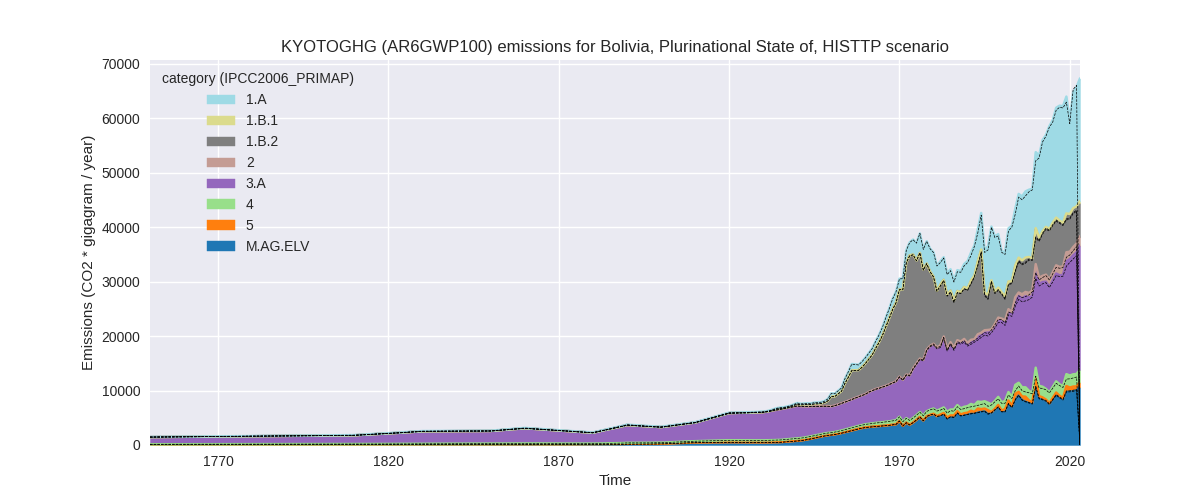
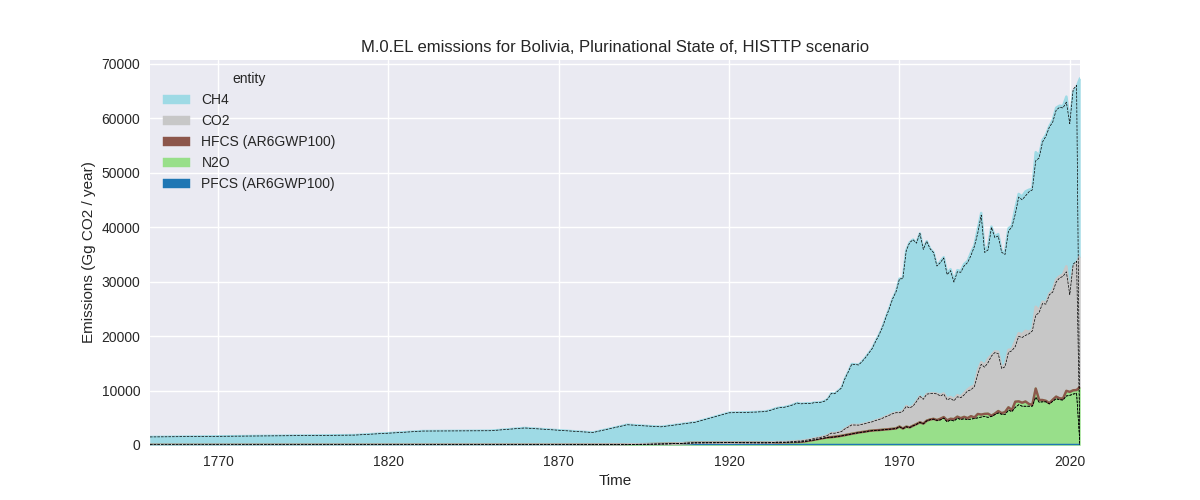
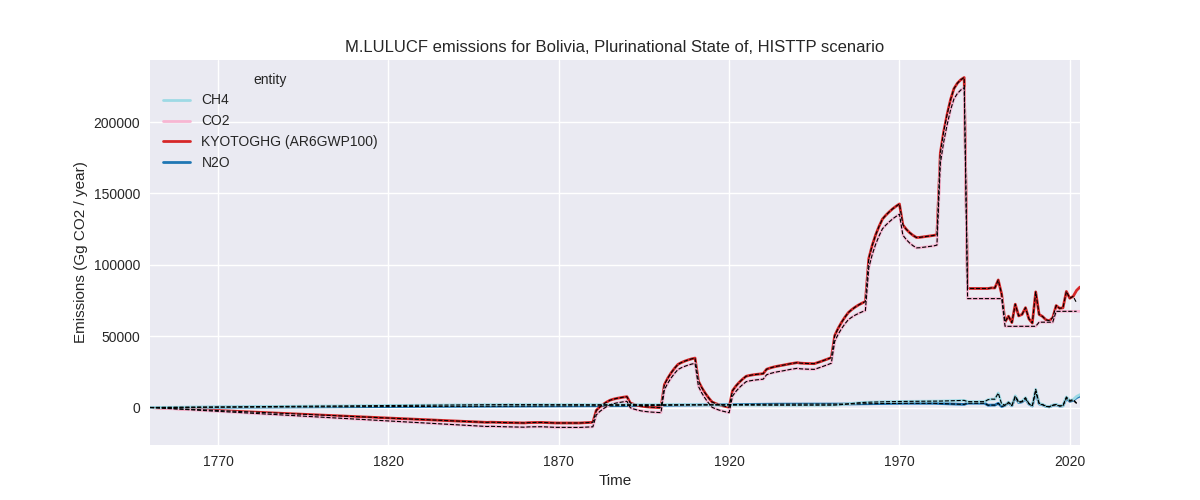
Overview over changes
In the country reported priority scenario we have the following changes for aggregate Kyoto GHG and national total emissions excluding LULUCF (M.0.EL):
- Emissions in 2022 have changed by -0.3%% (-295.33 Gg CO2 / year)
- Emissions in 1990-2022 have changed by 0.7%% (447.86 Gg CO2 / year)
In the third party priority scenario we have the following changes for aggregate Kyoto GHG and national total emissions excluding LULUCF (M.0.EL):
- Emissions in 2022 have changed by -0.4%% (-263.10 Gg CO2 / year)
- Emissions in 1990-2022 have changed by 0.9%% (431.35 Gg CO2 / year)
Most important changes per scenario and time frame
In the country reported priority scenario the following sector-gas combinations have the highest absolute impact on national total KyotoGHG (AR6GWP100) emissions in 2022 (top 5):
- 1: 1.A, CO2 with -983.37 Gg CO2 / year (-4.4%)
- 2: 5, N2O with 567.91 Gg CO2 / year (323.3%)
- 3: 1.B.1, CO2 with 142.18 Gg CO2 / year (272.0%)
- 4: 2, HFCS (AR6GWP100) with -53.15 Gg CO2 / year (-0.1%)
- 5: 4, CH4 with 21.08 Gg CO2 / year (0.7%)
In the country reported priority scenario the following sector-gas combinations have the highest absolute impact on national total KyotoGHG (AR6GWP100) emissions in 1990-2022 (top 5):
- 1: 5, N2O with 470.11 Gg CO2 / year (430.2%)
- 2: 1.A, CO2 with -70.01 Gg CO2 / year (-0.6%)
- 3: 1.B.1, CO2 with 36.63 Gg CO2 / year (42.7%)
- 4: 4, CH4 with 9.90 Gg CO2 / year (0.5%)
- 5: 4, N2O with 3.09 Gg CO2 / year (2.2%)
In the third party priority scenario the following sector-gas combinations have the highest absolute impact on national total KyotoGHG (AR6GWP100) emissions in 2022 (top 5):
- 1: 1.A, CO2 with -990.00 Gg CO2 / year (-4.4%)
- 2: 5, N2O with 567.91 Gg CO2 / year (323.3%)
- 3: 1.B.1, CO2 with 142.18 Gg CO2 / year (272.0%)
- 4: 1.B.2, CO2 with 10.75 Gg CO2 / year (10.7%)
- 5: 4, N2O with 8.64 Gg CO2 / year (5.9%)
In the third party priority scenario the following sector-gas combinations have the highest absolute impact on national total KyotoGHG (AR6GWP100) emissions in 1990-2022 (top 5):
- 1: 5, N2O with 470.11 Gg CO2 / year (430.2%)
- 2: 1.A, CO2 with -70.48 Gg CO2 / year (-0.6%)
- 3: 1.B.1, CO2 with 36.63 Gg CO2 / year (42.7%)
- 4: 1.B.2, CO2 with -7.25 Gg CO2 / year (-1.5%)
- 5: 4, N2O with 3.14 Gg CO2 / year (3.2%)
Notes on data changes
No country specific notes present for this changelog.
Changes by sector and gas
For each scenario and time frame the changes are displayed for all individual sectors and all individual gases. In the sector plot we use aggregate Kyoto GHGs in AR6GWP100. In the gas plot we usenational total emissions without LULUCF. ## country reported scenario
2022
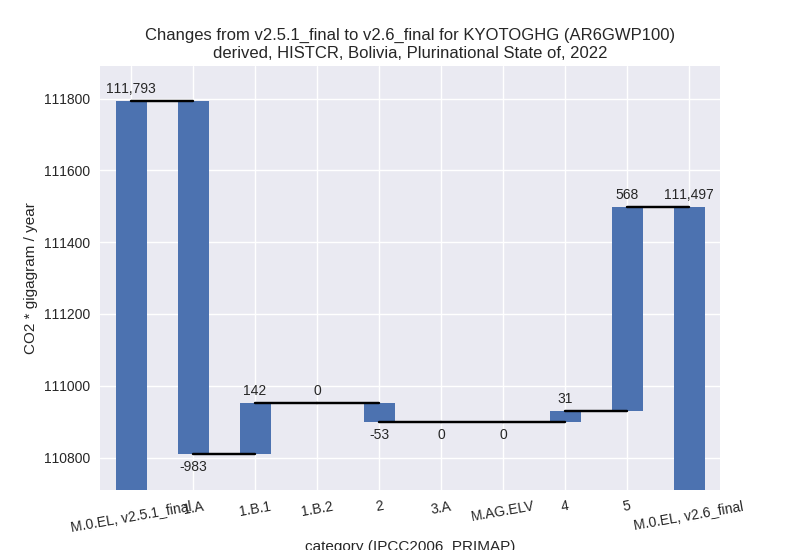
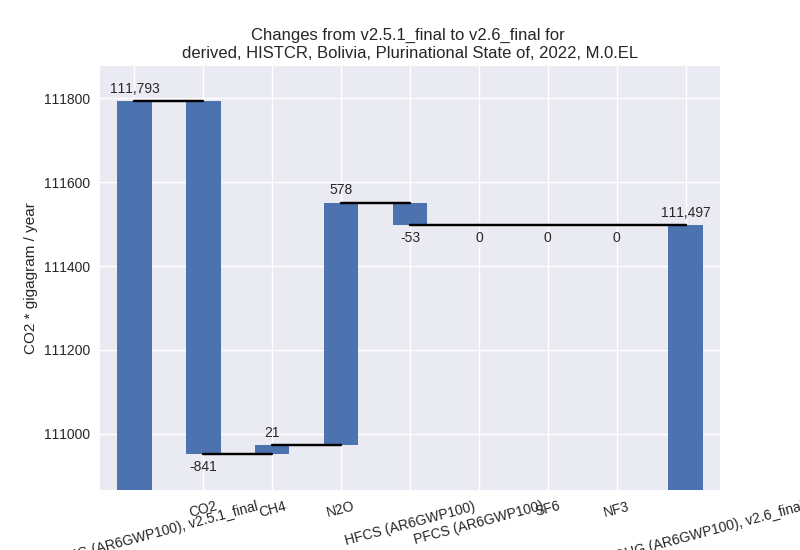
1990-2022
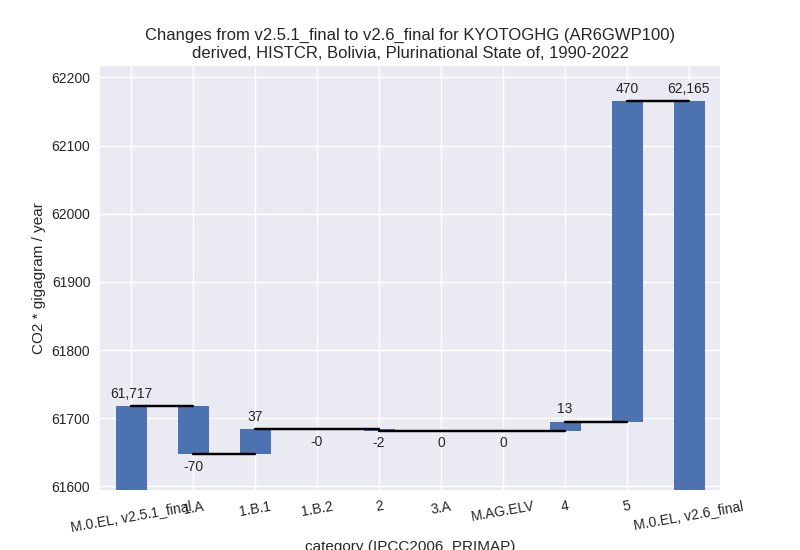
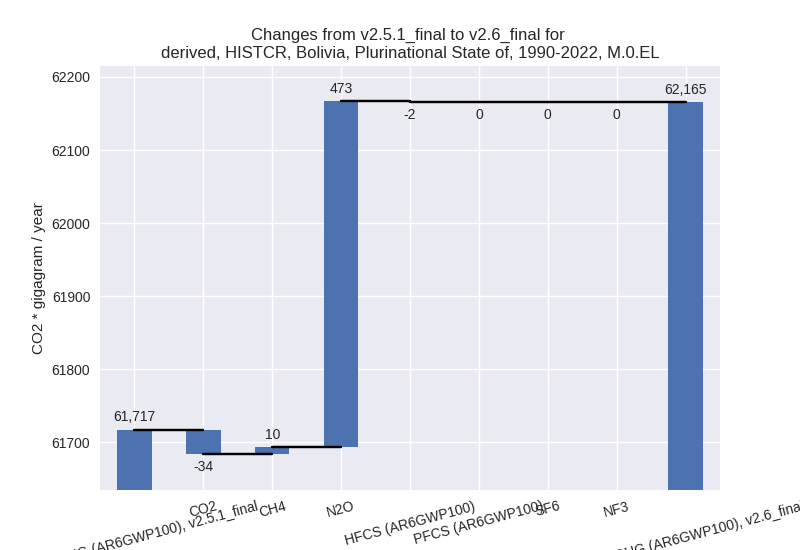
third party scenario
2022
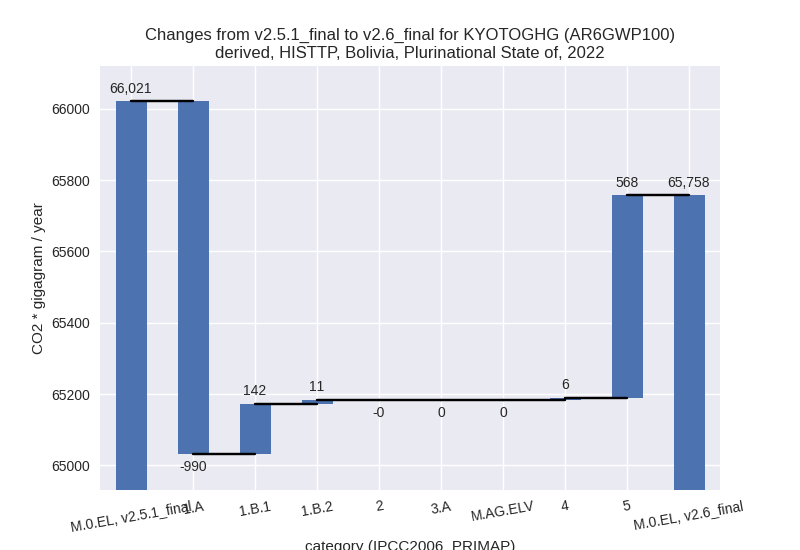
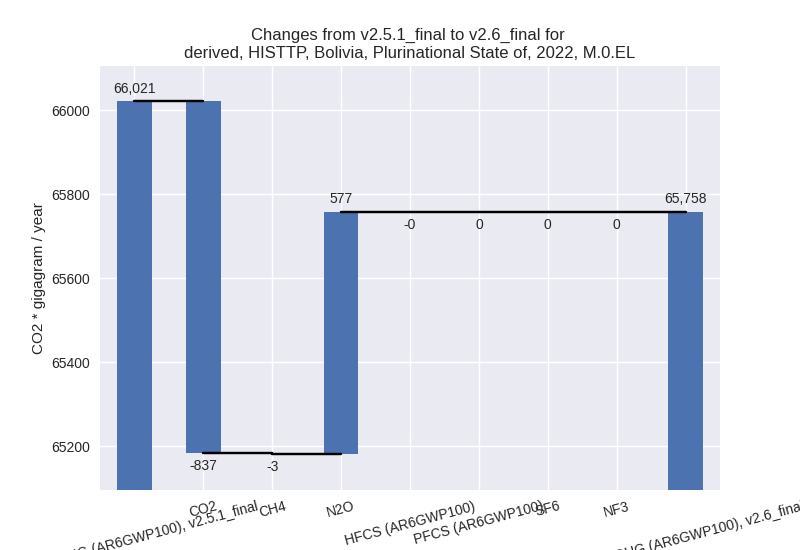
1990-2022
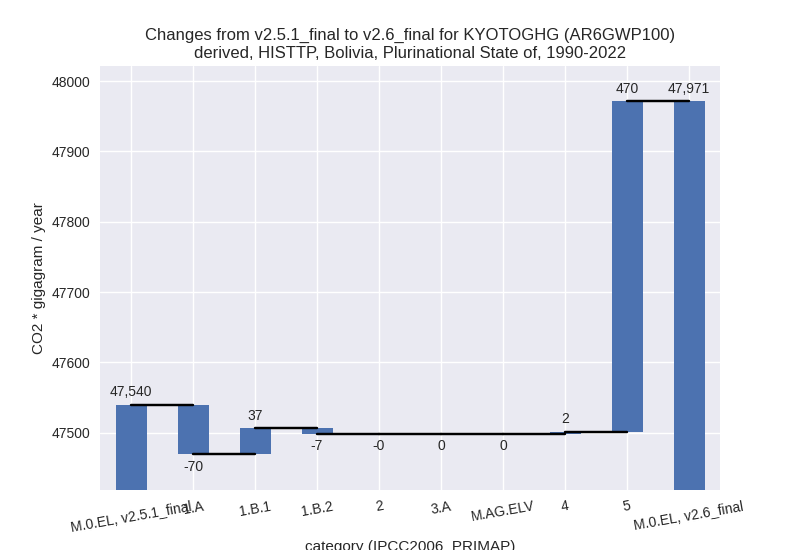
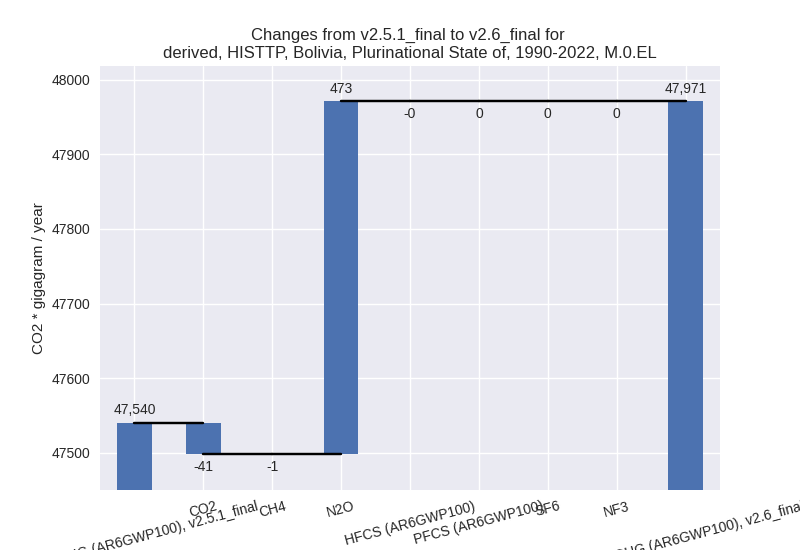
Detailed changes for the scenarios:
country reported scenario (HISTCR):
Most important changes per time frame
For 2022 the following sector-gas combinations have the highest absolute impact on national total KyotoGHG (AR6GWP100) emissions in 2022 (top 5):
- 1: 1.A, CO2 with -983.37 Gg CO2 / year (-4.4%)
- 2: 5, N2O with 567.91 Gg CO2 / year (323.3%)
- 3: 1.B.1, CO2 with 142.18 Gg CO2 / year (272.0%)
- 4: 2, HFCS (AR6GWP100) with -53.15 Gg CO2 / year (-0.1%)
- 5: 4, CH4 with 21.08 Gg CO2 / year (0.7%)
For 1990-2022 the following sector-gas combinations have the highest absolute impact on national total KyotoGHG (AR6GWP100) emissions in 1990-2022 (top 5):
- 1: 5, N2O with 470.11 Gg CO2 / year (430.2%)
- 2: 1.A, CO2 with -70.01 Gg CO2 / year (-0.6%)
- 3: 1.B.1, CO2 with 36.63 Gg CO2 / year (42.7%)
- 4: 4, CH4 with 9.90 Gg CO2 / year (0.5%)
- 5: 4, N2O with 3.09 Gg CO2 / year (2.2%)
Changes in the main sectors for aggregate KyotoGHG (AR6GWP100) are
- 1: Total sectoral emissions in 2022 are 22722.38 Gg
CO2 / year which is 20.4% of M.0.EL emissions. 2022 Emissions have
changed by -3.6% (-841.09 Gg CO2 /
year). 1990-2022 Emissions have changed by -0.2% (-33.62 Gg CO2 / year). For 2022 the
changes per gas
are:
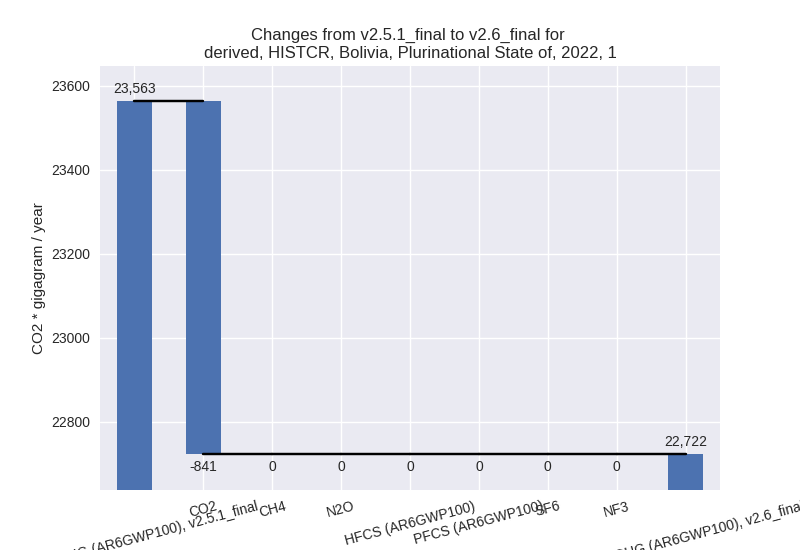
The changes come from the following subsectors:- 1.A: Total sectoral emissions in 2022 are 21476.30
Gg CO2 / year which is 94.5% of category 1 emissions. 2022 Emissions
have changed by -4.4% (-983.37 Gg
CO2 / year). 1990-2022 Emissions have changed by -0.6% (-70.01 Gg CO2 / year). For 2022 the
changes per gas
are:
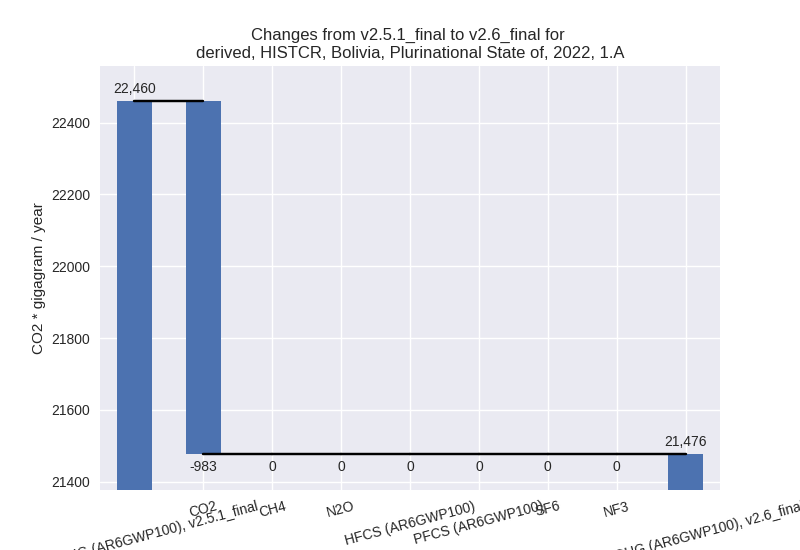
There is no subsector information available in PRIMAP-hist. - 1.B.1: Total sectoral emissions in 2022 are 332.14
Gg CO2 / year which is 1.5% of category 1 emissions. 2022 Emissions have
changed by 74.8% (142.18 Gg CO2 /
year). 1990-2022 Emissions have changed by 20.7% (36.63 Gg CO2 / year). For 2022 the
changes per gas
are:
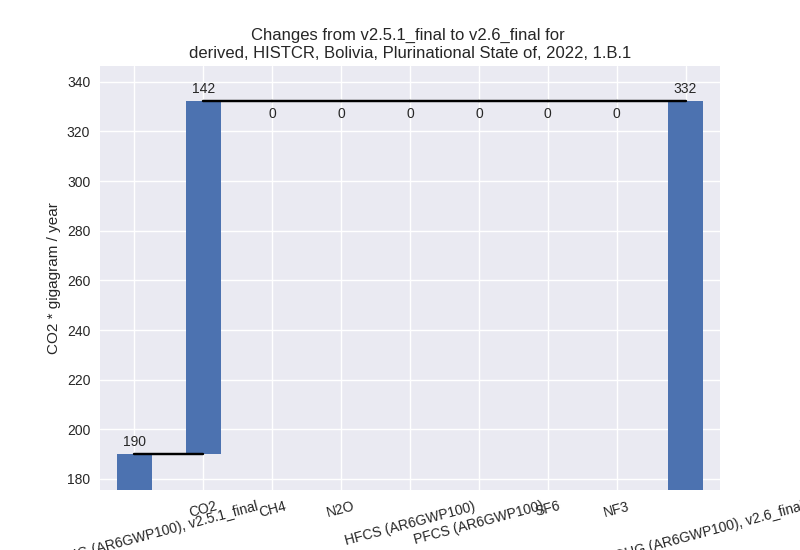
For 1990-2022 the changes per gas are: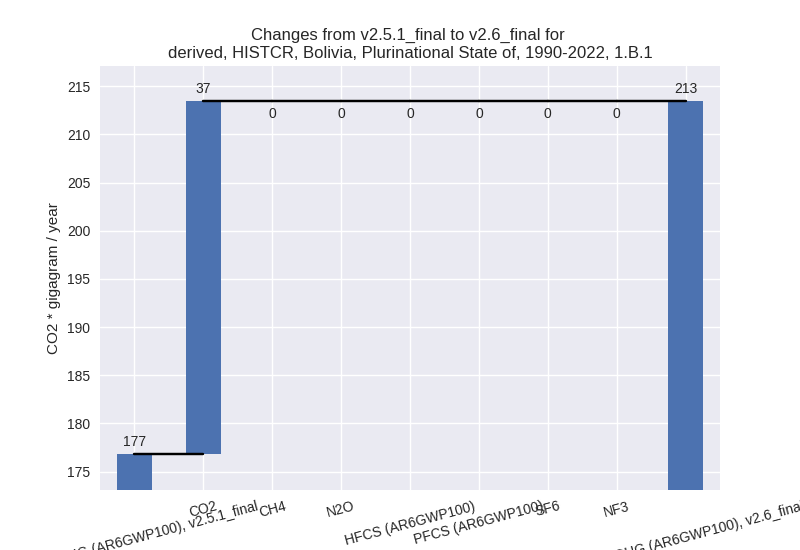
There is no subsector information available in PRIMAP-hist. - 1.B.2: Total sectoral emissions in 2022 are 913.94 Gg CO2 / year which is 4.0% of category 1 emissions. 2022 Emissions have changed by 0.0% (0.11 Gg CO2 / year). 1990-2022 Emissions have changed by -0.0% (-0.25 Gg CO2 / year).
- 1.A: Total sectoral emissions in 2022 are 21476.30
Gg CO2 / year which is 94.5% of category 1 emissions. 2022 Emissions
have changed by -4.4% (-983.37 Gg
CO2 / year). 1990-2022 Emissions have changed by -0.6% (-70.01 Gg CO2 / year). For 2022 the
changes per gas
are:
- 2: Total sectoral emissions in 2022 are 61442.57 Gg CO2 / year which is 55.1% of M.0.EL emissions. 2022 Emissions have changed by -0.1% (-53.15 Gg CO2 / year). 1990-2022 Emissions have changed by -0.0% (-1.61 Gg CO2 / year).
- M.AG: Total sectoral emissions in 2022 are 23220.79 Gg CO2 / year which is 20.8% of M.0.EL emissions. 2022 Emissions have changed by 0.0% (0.00 Gg CO2 / year). 1990-2022 Emissions have changed by 0.0% (0.00 Gg CO2 / year).
- 4: Total sectoral emissions in 2022 are 3367.98 Gg CO2 / year which is 3.0% of M.0.EL emissions. 2022 Emissions have changed by 0.9% (31.01 Gg CO2 / year). 1990-2022 Emissions have changed by 0.6% (12.98 Gg CO2 / year).
- 5: Total sectoral emissions in 2022 are 743.58 Gg
CO2 / year which is 0.7% of M.0.EL emissions. 2022 Emissions have
changed by 323.3% (567.91 Gg CO2 /
year). 1990-2022 Emissions have changed by 430.2% (470.11 Gg CO2 / year). For 2022
the changes per gas
are:
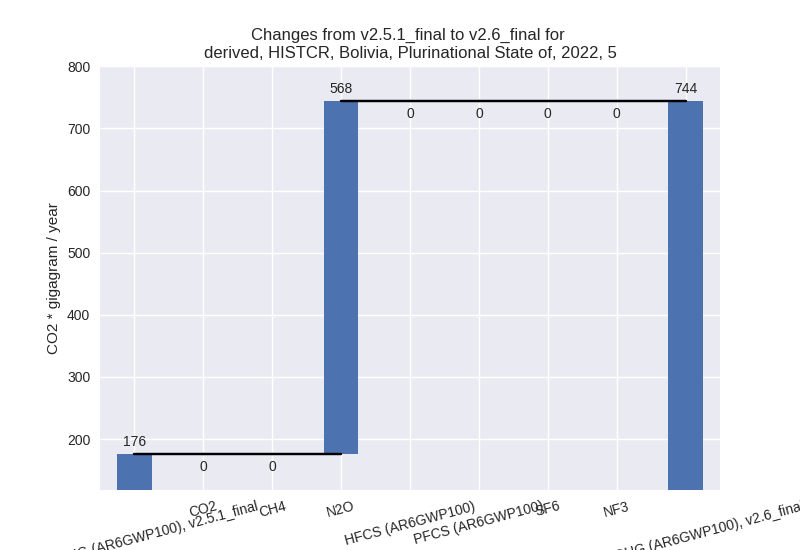
For 1990-2022 the changes per gas are: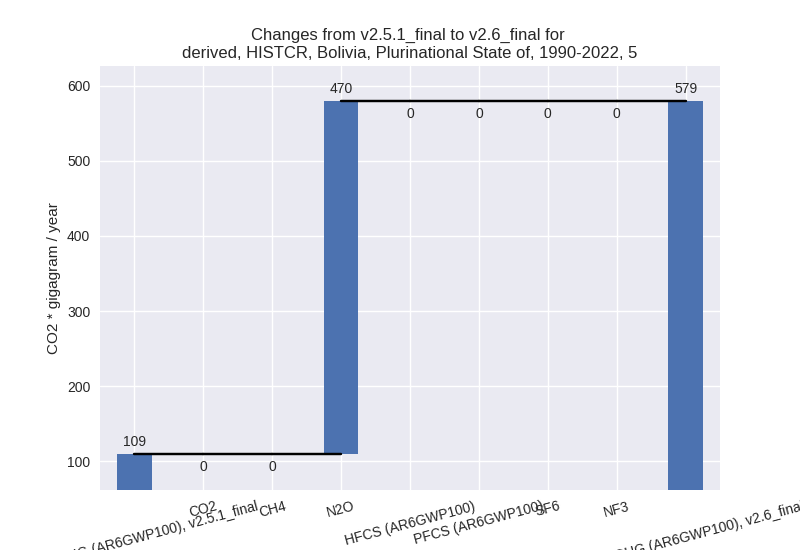
third party scenario (HISTTP):
Most important changes per time frame
For 2022 the following sector-gas combinations have the highest absolute impact on national total KyotoGHG (AR6GWP100) emissions in 2022 (top 5):
- 1: 1.A, CO2 with -990.00 Gg CO2 / year (-4.4%)
- 2: 5, N2O with 567.91 Gg CO2 / year (323.3%)
- 3: 1.B.1, CO2 with 142.18 Gg CO2 / year (272.0%)
- 4: 1.B.2, CO2 with 10.75 Gg CO2 / year (10.7%)
- 5: 4, N2O with 8.64 Gg CO2 / year (5.9%)
For 1990-2022 the following sector-gas combinations have the highest absolute impact on national total KyotoGHG (AR6GWP100) emissions in 1990-2022 (top 5):
- 1: 5, N2O with 470.11 Gg CO2 / year (430.2%)
- 2: 1.A, CO2 with -70.48 Gg CO2 / year (-0.6%)
- 3: 1.B.1, CO2 with 36.63 Gg CO2 / year (42.7%)
- 4: 1.B.2, CO2 with -7.25 Gg CO2 / year (-1.5%)
- 5: 4, N2O with 3.14 Gg CO2 / year (3.2%)
Changes in the main sectors for aggregate KyotoGHG (AR6GWP100) are
- 1: Total sectoral emissions in 2022 are 28751.75 Gg
CO2 / year which is 43.7% of M.0.EL emissions. 2022 Emissions have
changed by -2.8% (-837.08 Gg CO2 /
year). 1990-2022 Emissions have changed by -0.2% (-41.10 Gg CO2 / year). For 2022 the
changes per gas
are:
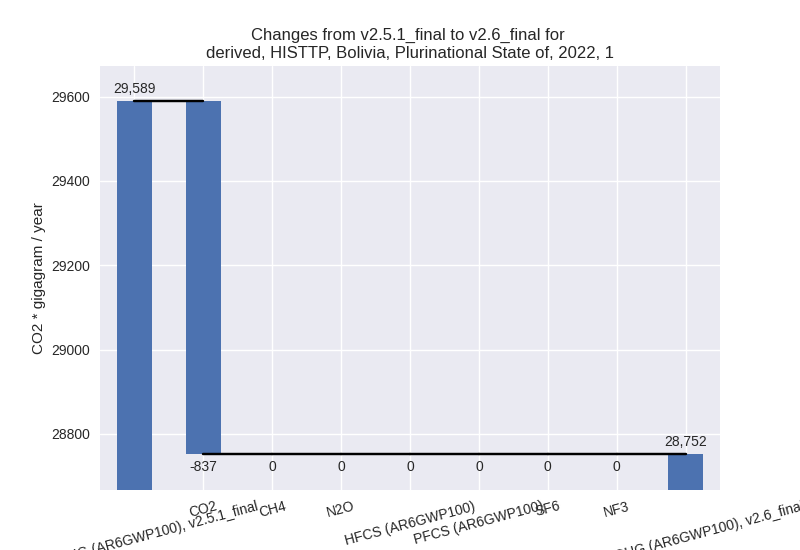
The changes come from the following subsectors:- 1.A: Total sectoral emissions in 2022 are 21925.28
Gg CO2 / year which is 76.3% of category 1 emissions. 2022 Emissions
have changed by -4.3% (-990.00 Gg
CO2 / year). 1990-2022 Emissions have changed by -0.5% (-70.48 Gg CO2 / year). For 2022 the
changes per gas
are:
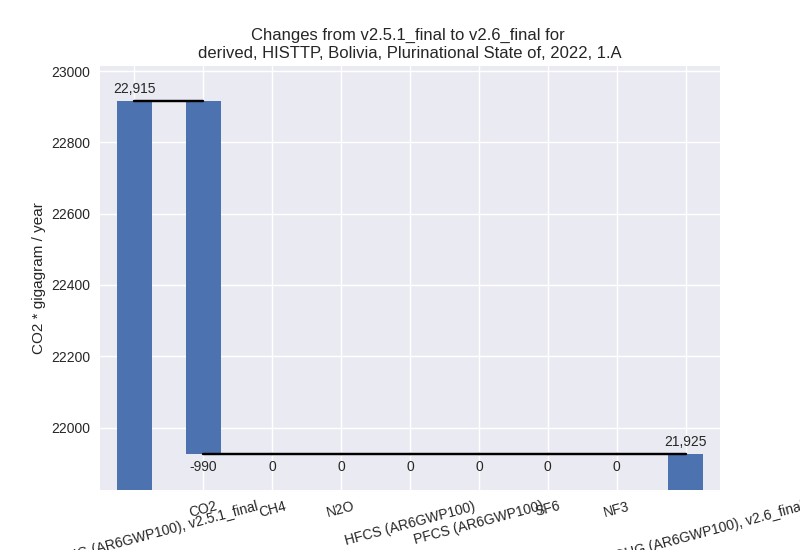
There is no subsector information available in PRIMAP-hist. - 1.B.1: Total sectoral emissions in 2022 are 332.14
Gg CO2 / year which is 1.2% of category 1 emissions. 2022 Emissions have
changed by 74.8% (142.18 Gg CO2 /
year). 1990-2022 Emissions have changed by 20.7% (36.63 Gg CO2 / year). For 2022 the
changes per gas
are:
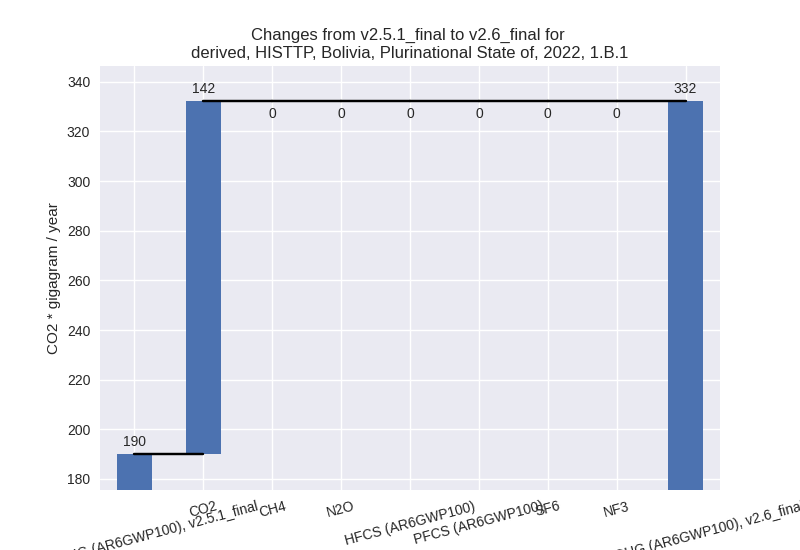
For 1990-2022 the changes per gas are: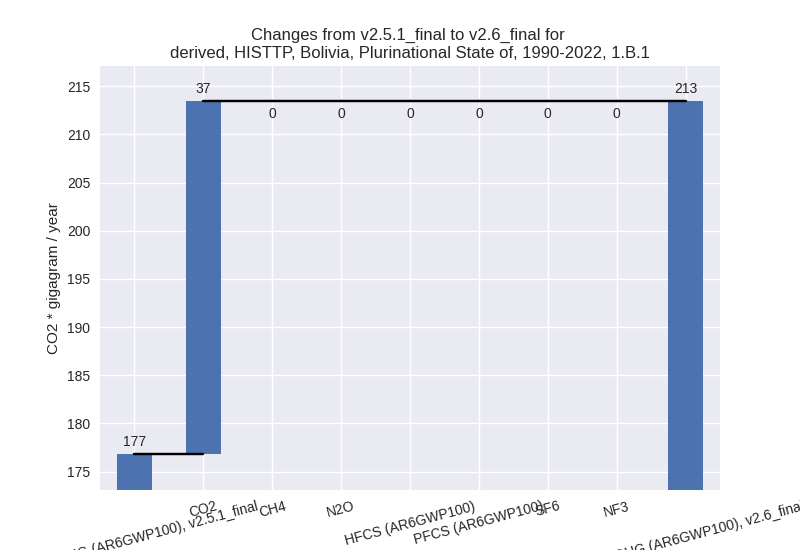
There is no subsector information available in PRIMAP-hist. - 1.B.2: Total sectoral emissions in 2022 are 6494.33 Gg CO2 / year which is 22.6% of category 1 emissions. 2022 Emissions have changed by 0.2% (10.75 Gg CO2 / year). 1990-2022 Emissions have changed by -0.1% (-7.25 Gg CO2 / year).
- 1.A: Total sectoral emissions in 2022 are 21925.28
Gg CO2 / year which is 76.3% of category 1 emissions. 2022 Emissions
have changed by -4.3% (-990.00 Gg
CO2 / year). 1990-2022 Emissions have changed by -0.5% (-70.48 Gg CO2 / year). For 2022 the
changes per gas
are:
- 2: Total sectoral emissions in 2022 are 1637.87 Gg CO2 / year which is 2.5% of M.0.EL emissions. 2022 Emissions have changed by -0.0% (-0.04 Gg CO2 / year). 1990-2022 Emissions have changed by -0.0% (-0.00 Gg CO2 / year).
- M.AG: Total sectoral emissions in 2022 are 32333.44 Gg CO2 / year which is 49.2% of M.0.EL emissions. 2022 Emissions have changed by 0.0% (0.00 Gg CO2 / year). 1990-2022 Emissions have changed by 0.0% (0.00 Gg CO2 / year).
- 4: Total sectoral emissions in 2022 are 2291.49 Gg CO2 / year which is 3.5% of M.0.EL emissions. 2022 Emissions have changed by 0.3% (6.11 Gg CO2 / year). 1990-2022 Emissions have changed by 0.1% (2.34 Gg CO2 / year).
- 5: Total sectoral emissions in 2022 are 743.58 Gg
CO2 / year which is 1.1% of M.0.EL emissions. 2022 Emissions have
changed by 323.3% (567.91 Gg CO2 /
year). 1990-2022 Emissions have changed by 430.2% (470.11 Gg CO2 / year). For 2022
the changes per gas
are:
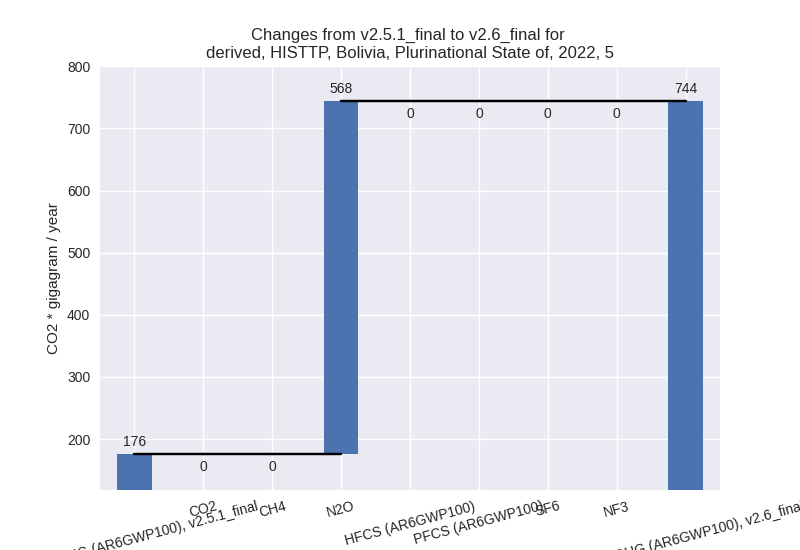
For 1990-2022 the changes per gas are: